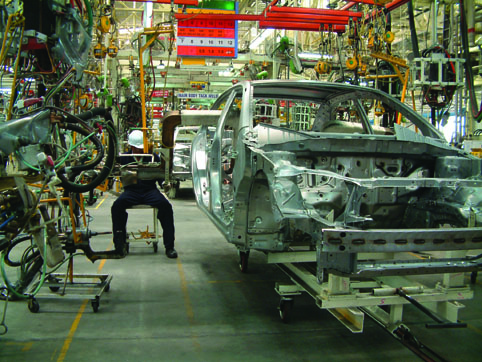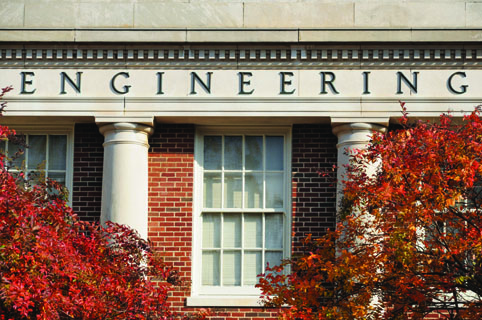Although a highly academic subject at university, engineering is an industry that lives off the application and development of new technology, and so perhaps it makes sense to say that engineering should be taught, at least in part, by engineers.
Semta, the engineering skills body, believes this to be true: it is necessary it says, that engineers with up-to-date experience of industry work in education in order to keep up the flow of new blood; experience enhances students’ learning and this ultimately attracts more into the profession.
But do engineers actually go into teaching? What are the opportunities for experienced engineers to forge mutually beneficial links between industry and academia?
Ann Watson, chief operating officer at Semta, says the industry’s view of the academic world is that it is not healthy, not what is needed; it is ‘stuffy’ and could do with a ‘breath of fresh air’. Indeed, she says that having engineers in the staffroom might be as important as having them in the classroom.
There is real concern within the engineering profession that an increasing number of higher-education staff teaching engineering have no industry knowledge or experience.
Ann Watson, Semta
Part of the problem is that teaching posts are being filled by new graduates as a means of funding further study. ‘There is real concern within the engineering profession that an increasing number of higher-education staff teaching engineering have no industry knowledge or experience. Many engineering graduates that choose to continue their higher-education studies and research activities full time have no option other than to accept teaching posts to fund their academic careers. ‘Hence some higher-education staff have no interest in teaching and this manifests itself in a poor learning experience for students. How such graduates can gain the necessary understanding and experience of industry-based engineering in a reliable and structured way remains unresolved with the UK.’

Watson says that while ground-breaking research within higher education around new technologies and materials gave academics the basis for sound teaching of those subjects and disciplines, they lacked the understanding of how industry applied new technologies and materials to design and make components, products and services. ‘This is where getting experienced engineers to teach in higher education would be so valuable.’
Good courses attract students, but students are not always the best placed to judge the quality of their teaching, she adds. ‘[Students] will judge the quality of teaching around the inter-personal skills of individual teaching staff. They would be unaware if teaching staff are out of step with current engineering practice used within industry.
‘Clearly, where students enjoy a good learning experience their feedback will help attract other students to study the subject; but, again, a good teaching experience could be out of step with industry and will only become visible when students graduate and seek employment within industry.’
Many within the profession would welcome higher-education funded infrastructure where academics and engineers from industry swap jobs for periods of one year
Ann Watson
Watson says that while employers and other ‘engineering stakeholders’ had a desire to see more engineers with sound industry experience teaching in higher education, proficient engineers can command higher salaries within the private sector, with arguably better career prospects. One solution to such a thorny problem is industry-funded secondments, and even job swaps, she said.’
‘Many within the profession would welcome higher-education funded infrastructure where academics and engineers from industry swap jobs for periods of one year; and where such academics have to spend this one year in industry every 10 years to refresh knowledge and learn how industry has changed within the 10-year period.’
Experienced engineers do teach in higher education, but they are most commonly employed on courses that have been established by individual companies. These courses are endorsed by an academic institution, places are reserved for the company workforce and the tutors are drawn from the experienced members of the engineering staff. This is a standard approach for large companies such as BAE Systems, which needs to develop a particular set of skills critical to its business and scarce in the marketplace, such as nuclear engineering. However, this is not a viable option for the vast majority of engineering businesses, with limited human resources.
Watson also suggests that financial assistance should be made available to foster this kind of exchange between industry and academia. ‘To create opportunities for sufficient experienced engineers to teach in higher education and make the necessary impact on a large enough scale there would need to be some financial encouragement, thus allowing smaller companies to hire contract engineers while their own engineers are seconded to higher education.’
Secondment schemes do exist, if in a slightly different form. For example, the EPSRC-supported Industrial Doctorate Centres (IDC), which allows students who want a career in industry to spend around 75 per cent of their time on the course working directly with a company.
Practising engineers and scientists are always in demand to bring real experience and colour to degrees at all levels.
Prof Chris France, Surrey University
The IDC at Surrey University offers an engineering doctorate, a four-year programme for researchers who aspire to key leadership positions in industry. The programme is academically equivalent to a PhD, but has one major difference, the student, or ‘research engineer’ spends the majority of their time at a sponsor organisation’s premises working on its commercial research priorities. They return to the IDC for short courses, conferences and seminars, designed to develop specialist technical knowledge.
Prof Chris France, director of the IDC at Surrey, says it relies on experienced engineers to deliver part of their tuition. ‘Practising engineers and scientists are always in demand to bring real experience and colour to degrees at all levels. For example, modules in the Centre for Environmental Strategy at the University of Surrey, where our Industrial Doctorate Centre is based, have a significant proportion of teaching given by such people.’

He adds that the IDC programme at Surrey enables a highly beneficial link between industry and centres of learning. ‘We embed our engineers in industry for four years and that gives all parties — the academics, the industrial sponsors and the students — the best-possible exposure to real industry practice. ‘The EngD makes a significant contribution to academic thought and to industrial practice. An example is a project we have been running with Sony Computer Entertainment Europe where the research engineer has produced two very high-quality publications alongside an evidence base that has had a demonstrable influence on European policy.’
It seems that everyone agrees it is a good idea to take advantage of industry experience when it comes to training the next generation of engineers, but does it actually happen on a broad scale?
According to a recruitment agency in this sphere, there is a demand particularly for engineers with experience in the automotive engineering, aerospace and defence sectors. But a lack of teaching experience can sometimes prove to be a stumbling block, says Heather Craddock, a client services executive at 360 Education. ‘There is a demand. The problem is that obviously people who are coming out of engineering may not have teaching experience or teaching qualifications. The question is are the universities prepared to do a bit of training, or is it that the teaching experience is more important, therefore they might not go for engineers, they might go for the academic community who won’t necessarily have the engineering background. That’s the difficulty we find.’




Red Bull makes hydrogen fuel cell play with AVL
Many a true word spoken in jest. "<i><b>Surely EVs are the best solution for motor sports</b></i>?" Naturally, two electric motors demonstrably...